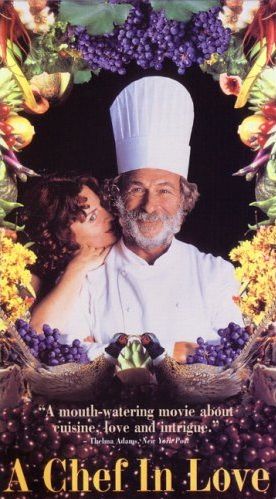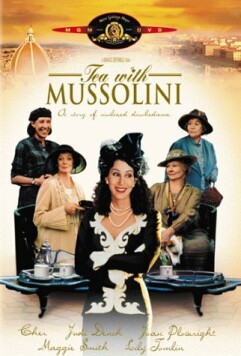Chef in Love, A (Les Mille et Une Recettes du Cuisinier Amoureaux)
A Chef in Love (or, to give it its French title, Le Mille et Un Recettes d’un Cuisinier Amoureux) by Nana Djordjadze is a Franco-Georgian film which takes the fast-track to success by foreign language films: include lots of food. Set in the Caucasus in 1920, it is the story of a French chef, Pascal Ichac (Pierre Richard), who, wandering like a cloud, finds himself stopped over Georgia and unwilling or unable to move on. He has fallen in love with a Georgian princess, the flame-haired Cecile Abachidze (Nino Kirtadze), and has such a good time with her that he decides to open the restaurant he has always dreamed of in her home town of Tblisi. It doesn’t hurt that his extremely acute sense of smell alerts him to the presence of a bomb under the president’s seat while they are both at the ballet.
It is a reminder of the political tensions of the period. As is the pursuit of the princess by the boor of an inkeeper, Sigmund (Teimour Kahmhadze), who turns out to be a Communist cadre. When the Communists take over, he is able to make sure that the restaurant is shut down and Pascal reduced to penury, and to marry Cecile by force. Cecile urges Pascal to make a run for it—to open his restaurant in Istanbul, or even Paris. But he refuses. “Communism will be over one day,” he tells her; “fine cuisine, never.” Symbolically, all Sigmund’s attempts to finish the old man off come to nothing, and we are left at the end with the last of many memorable scenes: the Communist functionary on a tin roof firing his sidearm, without effect, at a bee.
A bit of charming whimsy, but not exactly as convincing as it might be given the number of those who ended their lives in the Gulag or the execution cellars. Obviously we are meant to take the long view when Pascal tells Cecile that these “little Napoleons in the street that run and shoot and kill, where will they be tomorrow?” But it is a little glib. The dead haven’t the luxury of taking the long view.
The whole story is told in flashback from contemporary Paris, where Cecile’s 50ish son—surely too young?—Anton (Ramaz Tchkhikvadze) is learning of his family history for the first time from a niece of Pascal’s, called Marcelle (Micheline Presle). Unfortunately, this part of the story is not very well developed, and the present only really exists in the form of Anton’s anxiety as to whether he is Sigmund’s or Pascal’s son. Even the end of Communism is pretty much ignored. Marcelle is a “gastronomic photographer”—i.e. someone who takes pictures of food for magazines ( “temptation is the most difficult thing to bring across,” she says), so this may be meant to suggest that we live in an age less sensuous, more devoted to the image than to the reality. But if so, the idea is oversubtle and not borne out by the rest of the film.
Discover more from James Bowman
Subscribe to get the latest posts to your email.







